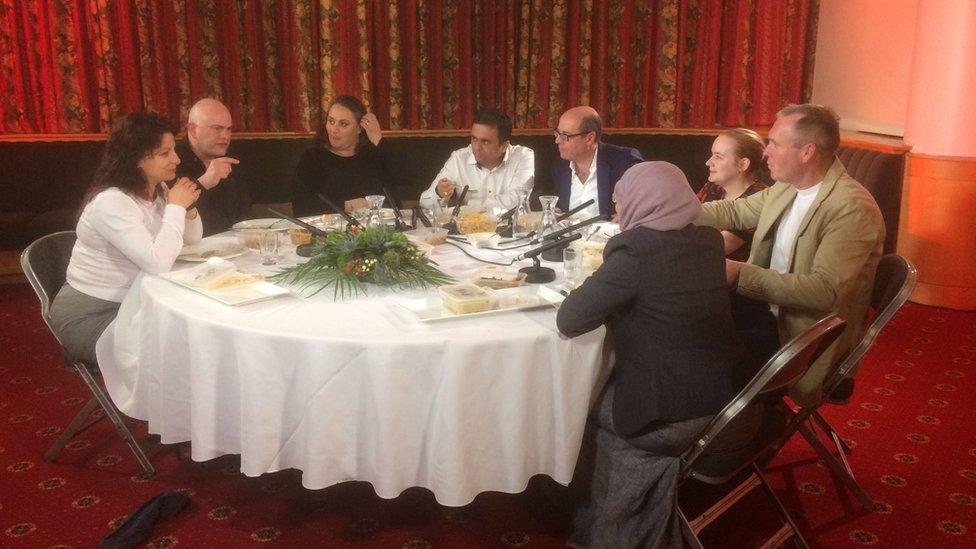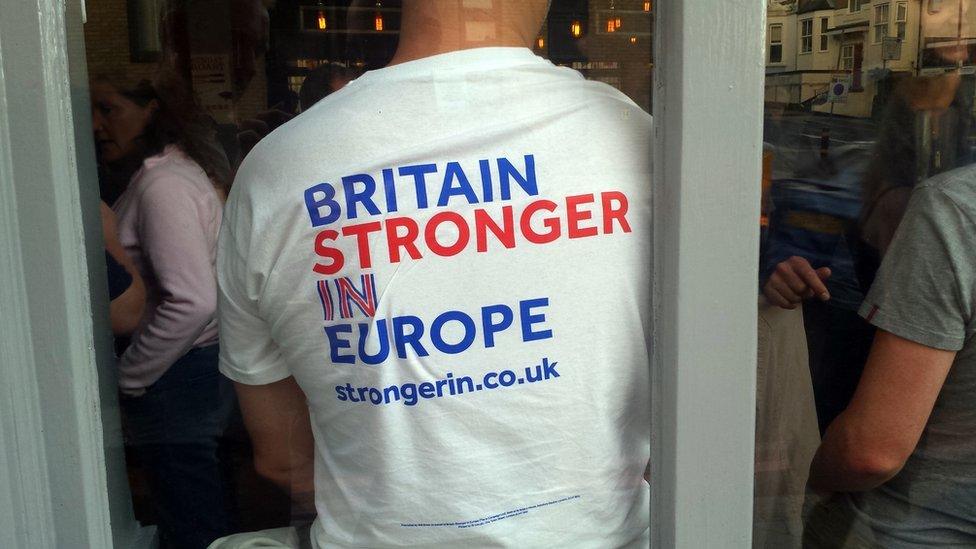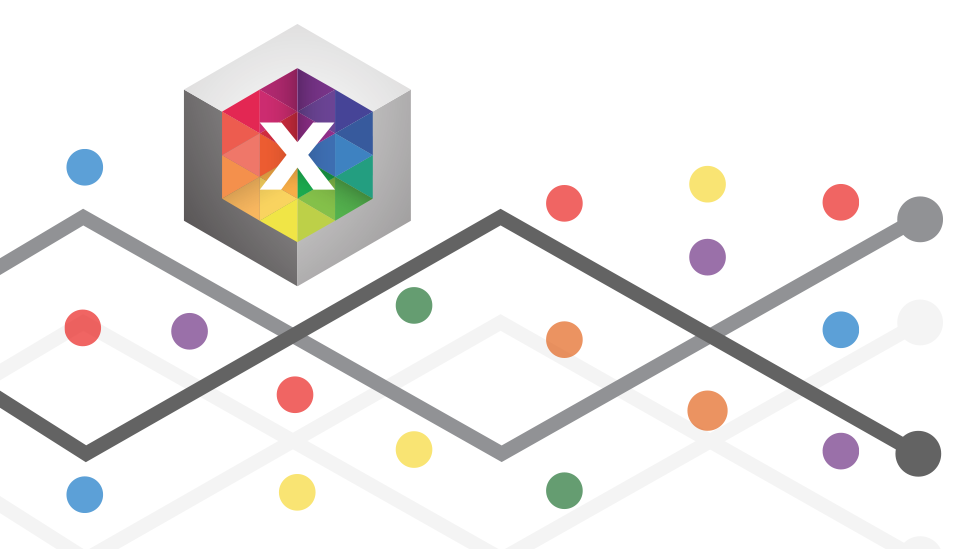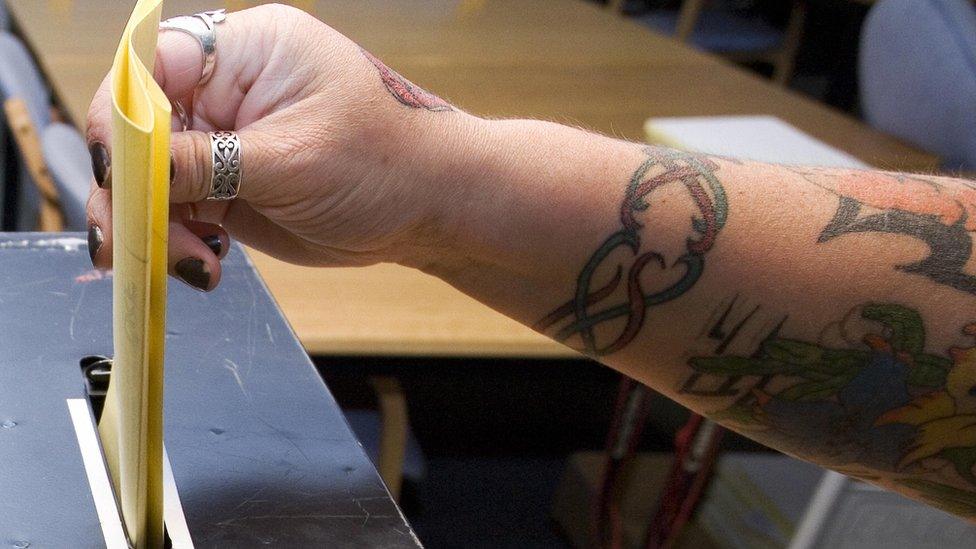Nick Robinson: The dilemma of Remain voters
- Published
Seven Remain voters discuss the choice they face in the UK general election on Radio 4's Today programme
In three weeks' time we will discover whether that referendum vote has dissolved the glue that bound voters to the party they have supported in the past.
That is what I have set out to examine in my Election Takeaways - a chat over a bite to eat with different groups of voters to discover what is on their minds and how they are going about deciding who, if anyone, to vote for.
This week, I shared a Thai takeaway with seven people who voted Remain in the EU referendum in the Tory marginal of Bedford.
Like the Leavers I spoke to last week in Halifax, they were chosen for us by the pollsters Ipsos Mori.
When Theresa May strode out of the door of Number 10 to call this election she claimed it was all about Brexit and not, as many believed, about her desire for her own mandate and a bigger Commons majority.

The discussion among our Remain voters revealed divided opinions about what should happen next
My conversation revealed a fascinating split in the attitudes of Remainers. All seven still believed we should have stayed in the EU and shared their unhappy memories of the moment they realised that Brexit would win, but they are deeply divided in their views about what should happen now.
Four of our seven Remainers told me that they thought the debate about our membership of the EU is now over and it is time to "just get on with it".
Fiorella has lived in Britain all her life but until recently had an Italian passport.
"The reason why Theresa May called a snap election is because she is asking us to choose who we believe is the best person to stand for us all and select the best deal for us," she says.
And Abhijit agreed. He moved to Bedford from Italy seven years ago and works for a local engineering firm.
"The election is an opportunity to vote for somebody you think will get the best deal after Brexit," he says.
Builder James also supported this view: "This is the situation we're in and it's important now to look forward and come together and get the best deal we can," he says.
Leela, who works with a local housing association, worries that a second vote might cause more division within society: "I think the majority of us who voted remain have accepted it and we just want to get on with it now."

Some of the Remain voters believe they should have a say on the final outcome of negotiations
The other three felt just as strongly that the public should have another say once the terms of any Brexit deal are known. They do not want to give Theresa May - or indeed, any prime minister - a blank cheque to negotiate with the EU.
"Why can't we vote on the settlement? It seems to be a lot of, 'I'm the leader to do this but you won't be able to vote on what I do,'" says Alastair, who fixes bikes.
"It's a bit like finding a fire going in your house and saying, 'Well it's going now'. I'd like to think it could change. I'm an optimist," says Maria who's in the music business.
Jen, a secretary in an estate agents, also remains sceptical. "We're voting in the general election but we're still going to be voting on something that we've not seen or had an opportunity to have a say on."
'I don't know who he is'
The Financial Times, external has dubbed this a split between Hard Remainers and Re-Leavers - those who voted Remain but now accept we are leaving. Working with the pollsters YouGov they have shown how the 48% who voted to stay in the EU are now split down the middle about what to do next.
This split means that parties like the Liberal Democrats, which have promised a second EU referendum, have a far smaller pool of voters to fish in than many suggest - just 22% of Hard Remainers to be precise.
They have another problem too if my group in Bedford is representative.
Those who wanted a second referendum had no idea that that was Lib Dem policy, and not one of them could name the Lib Dem leader - "I don't know who he is," says Leela. And yet three of my group had voted for the party in an election for the local mayor.
Jen voted for Dave Hodgson. "Obviously he's Liberal Democrat. I voted not necessarily because of the party he's with but because of the candidate."
No wonder the polls suggest that we are seeing a squeeze on the smaller parties and a return to two-party politics - at least in England.
Now you might think that you cannot draw any meaningful conclusions from such a small group of voters. Of course, you would be right to think that they cannot predict the result in any constituency let alone in the country as a whole. What they can do is add flesh to the bones of opinion polls.
My takeaway from this week's Election Takeaway is that if - and with three weeks to go it is still a mighty big if - Theresa May can attract the support of both those who voted Leave, whether they previously voted UKIP or Labour rather than Conservative, as well as those who voted Remain but now want the country to get on with leaving, she will have built an unstoppable coalition.
There is one thing that I heard that might limit the size of that coalition however, and that is whether Labour can successfully change what this election is seen to be about.
All the voters I spoke to in Bedford expressed their deep concern about the pressure on, or future cuts to, the NHS - an issue that has yet to really take off in this campaign. If Jeremy Corbyn is to have any chance of stopping a Tory landslide let alone winning outright he needs to persuade the sort of voters I have been speaking to that traditional domestic concerns matter as much, if not more, than Brexit.
Next week, I'll be in another town talking to those Theresa May has dubbed the "Just About Managing" getting their views on which policies, party and politician might do most to help them.
You can watch more of Nick's Election Takeaway on the BBC News Channel this weekend at 14:30 and 20:30 BST on Saturday and 10:30 and 16:30 BST on Sunday.


- Published13 May 2017
- Published19 December 2017

- Published2 June 2017

- Published2 May 2017